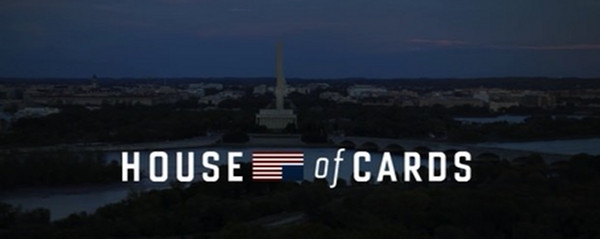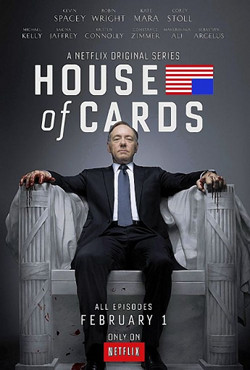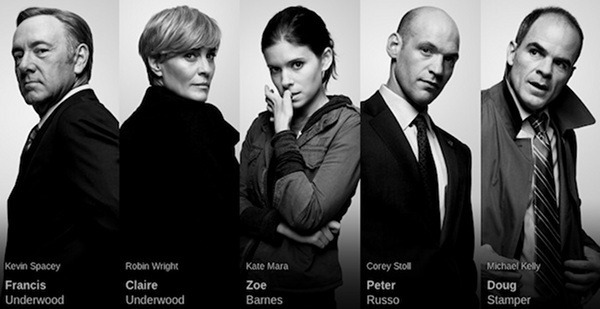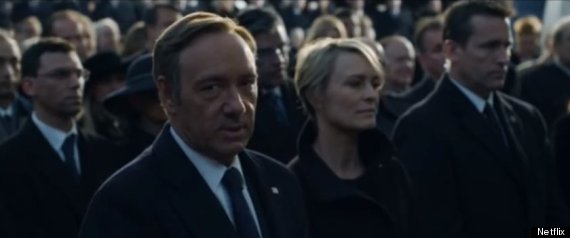
This is Part 1 of a two-part review of Netflix’s* excellent new series, House of Cards. Part 1 will be free of spoilers while next week I plan on going more in-depth discussing the material. This is a show and release-experience that warrants both approaches. So get watching and we can dive-in head first next week.
Netflix’s latest groundbreaking endeavor, one that finds them forging their own programming, could very well signal the future of how we devour our entertainment. If and when that proves true, it’ll be in no small part thanks to House of Cards.
A political thriller adapted from a 1990 British miniseries which was itself an adaptation of a Michael Dobbs novel, Cards’ first season touts all the sex and slickness of an HBO drama, the nuance and intrigue of AMC fare, and without the distraction wrought forth from the commercials or censorship of network television.
 If the show is entertaining, the manner in which it’s being rolled out to the public just prove revolutionary: an entire season released on a single day for consumption at your own pace. For anyone who’s discovered a show for the first time through DVD, the actual viewing experience (available via their streaming sevice) will feel almost identical. Netflix takes a mighty risk here however, as spoilers are already making rounds on Facebook and Twitter. Whether that turns off potential adopters or further entices them remains to be seen.
If the show is entertaining, the manner in which it’s being rolled out to the public just prove revolutionary: an entire season released on a single day for consumption at your own pace. For anyone who’s discovered a show for the first time through DVD, the actual viewing experience (available via their streaming sevice) will feel almost identical. Netflix takes a mighty risk here however, as spoilers are already making rounds on Facebook and Twitter. Whether that turns off potential adopters or further entices them remains to be seen.
While Netflix’s day-one game plan has been anticipated for sometime, viewer reaction is still a mystery. Critically the show will do fine, some light growing pains in the first few episodes give way to an engrossingly devilish political menagerie (that I’ll go into at great length momentarily), held together by a solid cast and structured around an almost unrecognizable turn from Kevin Spacey.
The unknown lies in how everyone who watches… watches. Do you do as I did, marathoning through an entire season in one weekend? Do you wait and do one episode a week, a night, every other day? Or do you simply not have room for a new show in your life? How you approach House of Cards will be just as integral a part of the conversation as what you think about it – and Netflix is paying as much attention to the former as they are the latter. Not approaching the series at all would be unfortunate, as there’s an immensely solid experience to be had.
With a show as watchable and engrossing as this, I suspect many will want to consume it quickly and thoroughly. As I write, I’ve already begun my second play-through. I’m in no rush to finish this time out, content to experience different facets I may’ve missed. It’s not been difficult getting pulled into this elaborate hyper-reality that David Fincher (exec. producer, director of the pilot), Spacey (exec. producer, star) and company have shaped.

Congressman Francis Underwood (Spacey), representing South Carolina’s 5th District, is an antihero that in thirteen episodes more than earns his seat at a table that includes Tony Soprano, Vic Mackey and Walter White – the pantheon of television leads exercising questionable morals. And where some of the characters I mention began their arcs as somewhat honorable men, Underwood is already compromised by the time he invites us into his DC abode. He’s a decidedly evil man, irredeemable in his actions and deplorable in his convictions. He exudes oily charm his, massaging massaging his targets’ wants and needs until he has them in the palm of his hand, all the while looking for the most tender spot to put the knife. His relationships, be they personal, familial or sexual, are all open to vile manipulation if it serves an endgame.
Part of the show’s charm: that endgame doesn’t come entirely into focus until the final episodes. As a spurned representative and majority whip, Underwood use one of the first of many monologues to inform us, “My job is to clear the pipes and keep the sludge moving.” He’s the guy that handles all the deal making and backstabbing, maneuvering through the congressional halls and devouring the food chain as he sees fit. When he’s passed over for the President Elect’s Secretary of State, he goes to work mobilizing allies like his chief of staff Doug Stamper (Michael Kelly) or lowly Washington Herald blogger Zoe Barnes (Kate Mara) to divide and conquer.
 And through it all Spacey is sublime, giving a multi-layered performance that showcases some of his career’s finest work. Underwood’s clearly a role he enjoys, one that allows us to watch both actor and script expound layer after layer upon an already complex character. I mentioned earlier that Spacey’s nigh unrecognizable, and it’s mainly because the role feels very un-Spacey. Yet it shouldn’t, as the performer’s assumed some of the biggest bads in history: John Doe, Keyser Sose, Lex Luthor, K-Pax. This turn feels freer than those. There’s such revelry on display that his enjoyment becomes palpable.
And through it all Spacey is sublime, giving a multi-layered performance that showcases some of his career’s finest work. Underwood’s clearly a role he enjoys, one that allows us to watch both actor and script expound layer after layer upon an already complex character. I mentioned earlier that Spacey’s nigh unrecognizable, and it’s mainly because the role feels very un-Spacey. Yet it shouldn’t, as the performer’s assumed some of the biggest bads in history: John Doe, Keyser Sose, Lex Luthor, K-Pax. This turn feels freer than those. There’s such revelry on display that his enjoyment becomes palpable.
The reason Underwood will feel familiar to fans of The Sopranos, The Shield or Breaking Bad is due in part to how dangerous he becomes to those who fall under his sphere of influence. His philanthropic wife Claire (Robin Wright) is treated somewhat as an equal. Uniformly cold and calculated, she accepts him and shares his ambitions, well aware of many if not all his heinous tactics. Others, such as Zoe or Congressman Peter Russo (Corey Stoll, seen as Hemingway in Midnight in Paris) aren’t so lucky. Both will find themselves at odds with Underwood even as they’re unknowingly helping him accomplish his ultimate goal.
I admittedly struggled with the pilot, the first of two episodes directed by Fincher. A second viewing’s been kinder. The competent craftsmanship at hand is un-doubtable, but it takes a few beats to dial into Cards’ eclectic and macabre cadence. The writers work to establish the business relationship between Barnes and Underwood while setting up the intricacies and interactions that make up HOC’s decrepit Capitol Hill. There are aspects that jar early on, chief among them scenes featuring Underwood relaying his innermost thoughts directly into the camera.

It’s a somewhat irritating device that feels lazy in the early going, the pilot in particular – as they’re clearly still figuring out how it should be used. Funny thing, by the end of the season I found myself waiting, hoping that Frank would say anything into the camera, letting us in on his latest diabolical con – essentially the viewer becomes another of Underwood’s pets, counting on him to show us the way. It’s also employed much more slyly as the episodes progress and Spacey becomes more comfortable integrating it into scenes where he shares dialogue. What starts as a potential dealbreaker works itself into a strength, though it’s a device that took some getting used to, at least for me.
Fincher’s trademark visual style is employed throughout the entirety of the first season – or at least handled consistently in the progression. In directing the pilot the director set the template; all clean, sterile imagery framed meticulously in drab colors.
 That professional Hollywood look pays off in spades, as the show’s not as contextually rife as a Mad Men or Sopranos (yet). Its visual panache serves as wise flavoring that puts it on level with top notch cable serials.
That professional Hollywood look pays off in spades, as the show’s not as contextually rife as a Mad Men or Sopranos (yet). Its visual panache serves as wise flavoring that puts it on level with top notch cable serials.
With a second season guaranteed, HOC now has the opportunity to go to deeper territories that can mine headier fare. As is, this is a surprisingly straightforward narrative that’s made engrossing partly by what Frank choses not to tell the viewer. It’s a somewhat noticeable cheat when a character that confesses almost everything withholds information, but it’s inarguably where some of the show’s major twists are derived. Of course characters don’t always behave as Underwood predicts, furthering unpredictability via a much more organic approach.
House of Cards premiered on a Friday, I finished its 13 episodes on a Sunday, and I’m now already jonesing for a second season (guaranteed in Netflix’s deal) on this, a Monday. I can give no finer compliment than pronouncing my frustration at Netflix for not providing us more episodes immediately, as clearly we’ve been spoiled. Still, I’m excited to revisit the season with a more subjective eye while still enjoying the slithering rise of Rep. Frank Underwood. I suspect many others will as well. Not only do we have a great new show; we’ve been awarded an entirely new way of watching it.
And if you happen to finish the season, come back next week when I dissect the plot.
Rating: 




Out of a Possible 5 Stars
*Full disclosure, this writer had the opportunity to visit the set of another Netflix series a few months back. While I look forward to relaying that experience, it in no way related to my approaching House of Cards nor did it dissuade my initial skepticism as I booted up HOC’s first season last weekend. I just really dug this show, god damnit.